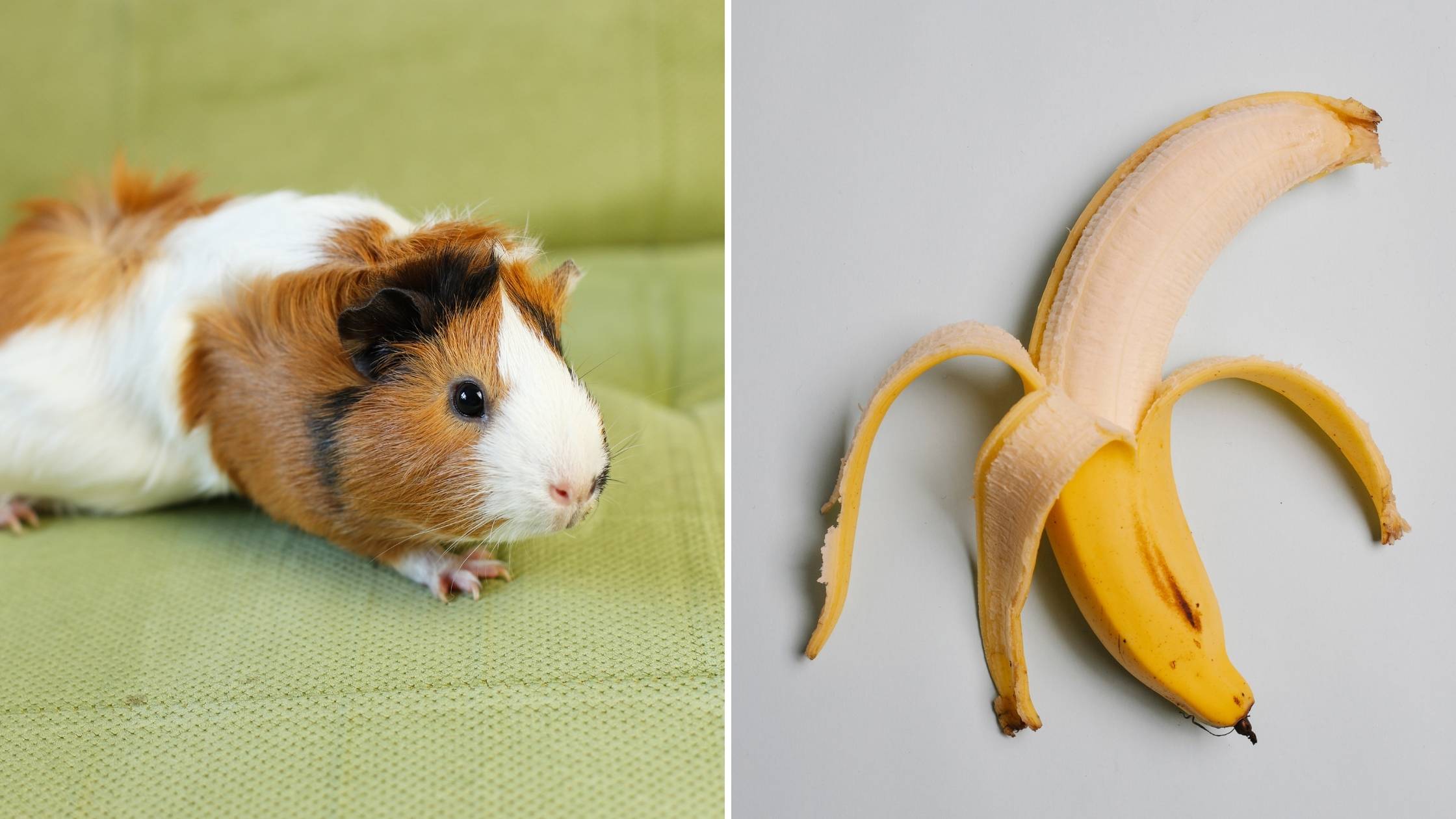Last Updated on 05/21/2021 by Veronica Jones
Guinea pigs are popular pocket-sized pets, known for being playful and sociable animals. With 13 different recognized breeds of guinea pig, you are sure to find one that is compatible with your lifestyle.They are relatively low-maintenance creatures, perfect for responsible owners living in smaller spaces. They can eat a wide variety of foodstuffs to keep them healthy but the question here is: can guinea pigs eat bananas?
Let’s find out…
Can Guinea Pigs Eat Bananas?
Yes, but in moderation. Guinea pigs can eat a small amount of banana as part of a balanced diet, but not too often, and not in large quantities. If eaten in this way, bananas also offer many nutritional benefits for guinea pigs.
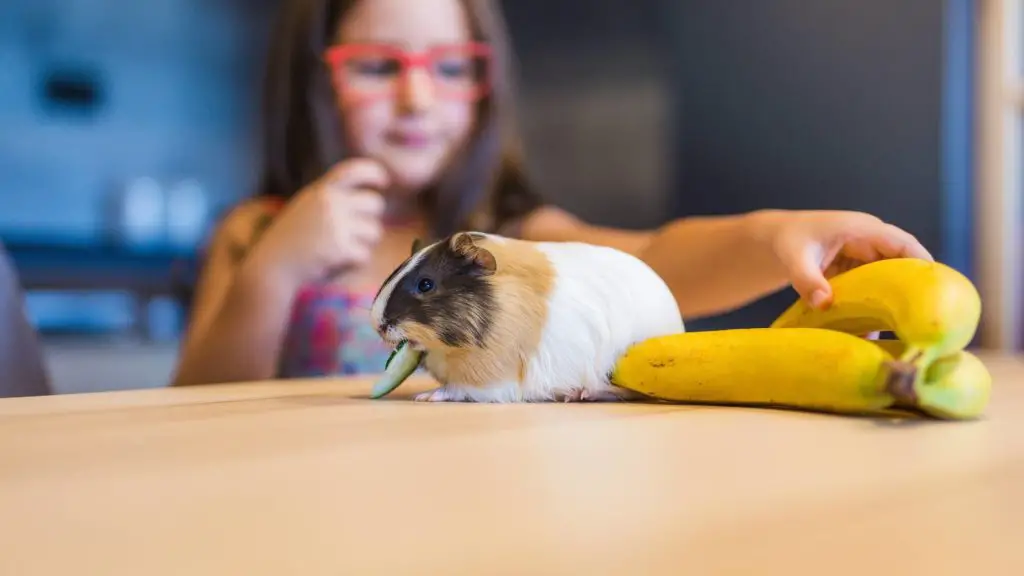
Do guinea pigs like bananas?
So, guinea pigs CAN eat bananas, but do they LIKE them?
As with all animals, taste preferences differ. However, it’s safe to say that most guinea pigs are banana fans, with the sweetness of these yellow snacks appealing to a guinea pig’s taste buds, however there certainly are drawbacks to bananas. This is why you should be sure to regulate the amount of banana that your guinea pig is eating – left to their own devices, they’d happily snack away!
How much banana can I feed my guinea pig?
A couple of cubes of banana is an ideal serving for your guinea pig. This treat should be limited to 2-3 times a week and should not be offered for two days in a row.
The bananas should be ripe and fresh. It is important to let your guinea pig smell the banana before giving it to them. If they don’t like it and leave it sitting in their cage, the banana will eventually become harmful to eat.
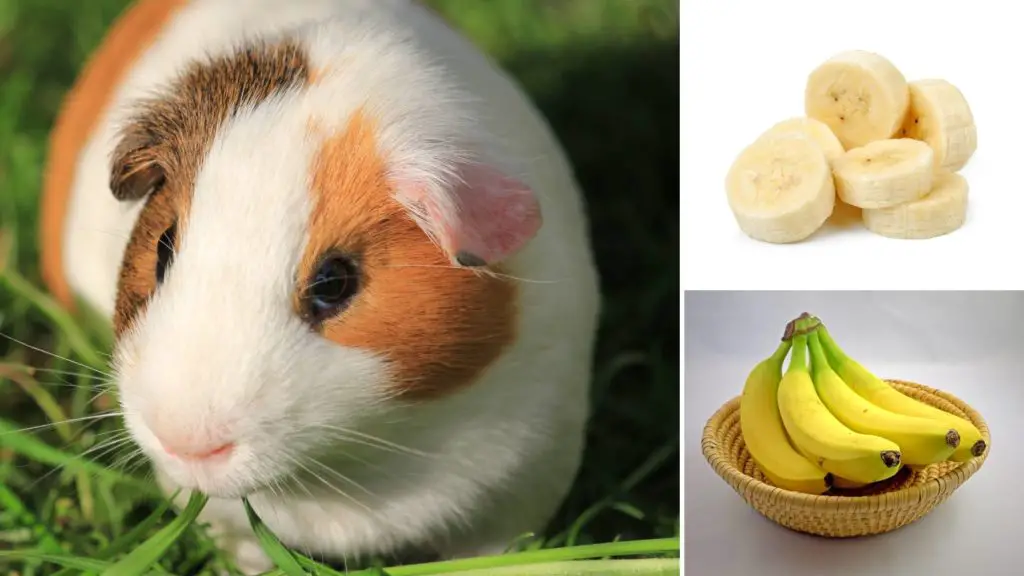
Do bananas have health benefits for guinea pigs?
The short answer is, in small amounts, yes! Bananas include:
- Antioxidants: can help protect cells from damage from free radicals
- Vitamins A, B1, B6 and C: they contribute to protecting the guinea pig’s immune system, as well as looking after their growth, reproductive system and eyesight
- Essential minerals including potassium, magnesium, calcium and iron: strengthen bones and tissues
The benefits of vitamin C for guinea pigs
Vitamin C deficiency in guinea pigs can lead to scurvy, poor skin and bone health and weight loss.
Guinea pigs cannot produce their own vitamin C and so it is crucial that it is supplemented within their diet. While bananas do provide vitamin C, they shouldn’t be relied upon as the main source of the vitamin. Vitamin C supplements can easily be picked up in pet stores.
Are bananas bad for guinea pigs?
In small doses, bananas are a perfectly safe treat for your guinea pig.
However, the question of whether guinea pigs can eat bananas is a bit more complicated, given the nutritional makeup of bananas.
Bananas are made up of 12% sugar, making them one of the most sugary fruits going. For context, this is twice the amount of sugar that is in a strawberry.
Feeding too much banana to your guinea pig can lead to gas, bloating, upset stomachs and diarrhea. These nasty side effects can result in dehydration, meaning a trip to the vet might be necessary.
Because bananas are so high in sugar, your guinea pig overeating them can not only lead to diarrhea but even risk diabetes. Just like humans, guinea pigs can get both Type 1 and Type 2 diabetes from a high-sugar diet or from being overweight.
Can bananas kill guinea pigs?
Bananas are not poisonous to guinea pigs, however the high volume of sugar can lead to obesity which is not good for your little pet’s health.
Can guinea pigs eat banana peel?
Banana peel is a funny issue! While it is perfectly safe for your guinea pig to eat, the chewy peel is often less appealing than the soft, tasty fruit inside. So don’t be surprised if your pet chomps on the banana flesh but ignores the peel.
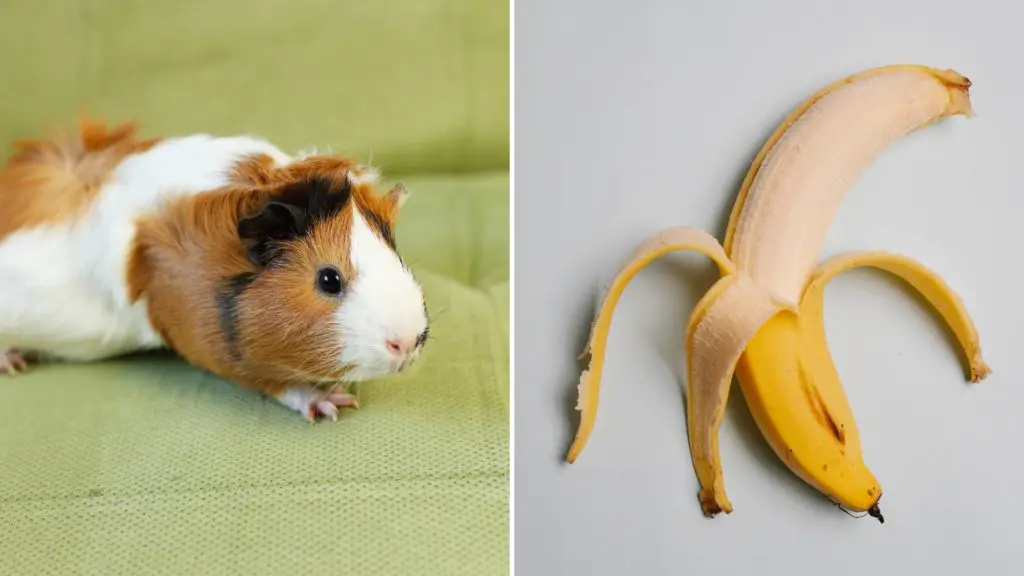
However…
The peel itself is actually quite nutritious for your guinea pig. It contains:
- Antioxidants (fight danger molecules called free radicals which can lead to cancer and heart conditions)
- Fiber
- Potassium (helps muscle movement)
- Magnesium (benefits metabolism)
- Vitamins B6 and B12
- Protein
If possible, buy organic bananas if you want to feed the peel to your guinea pigs in order to avoid any dangerous pesticides that might have been sprayed by banana farmers. However, even with organic fruit, it is still important to wash the skin before giving it to your guinea pig, just to stay on the safe side.
So feel free to feed your guinea pig a little bit of banana peel, but prepare for them to reject it. You’ll even have the added bonus of using up some of the skin, rather than just having to throw it away!
Can guinea pigs eat dried bananas?
Any sort of dried banana (including banana chips) should be avoided. They tend to be highly processed and coated in sugar, in addition to the high level of sugar already existing in the banana.
Artificial oils and flavourings can also be added to dried banana chips which would be harmful for your pet. So, if you’re going to feed banana to your guinea pig, be sure to stick to the fresh fruit.
Alternatives to banana
While we’ve learned that bananas are safe for guinea pigs to eat, it might be worthwhile looking for snack options that aren’t so loaded with sugar. Some tasty fruit alternatives include:
- Blueberries
- Strawberries
- Grapes
- Melon (especially watermelon!)
- Pineapples
Meanwhile, some delicious and healthy vegetable options are:
- Asparagus
- Cucumbers (including the skin)
- Squash
- Zucchini
- Carrots (including the tops)
- Broccoli (but in moderation as too much can cause gas)
- Pumpkin
- Celery (but try to remove the strings which can be a choking hazard)
- Peppers (of any color – very high in vitamin C)
- Parsnip
Are there other foods to avoid feeding your guinea pig?
Before feeding your guinea pig, it really is important to investigate which foods might harm your pet. There are several ways in which foods can be dangerous: they might be poisonous, lead to gas or bloating, be very high in fat or sugar, have no nutritional value or be choking hazards. A list of the key foods to avoid feeding your guinea pig includes:
- Chocolate (or anything else containing caffeine)
- Onions
- Garlic
- Mushrooms
- Iceberg lettuce
- Avocados
- Nuts
- Potatoes
- Seeds
- Corn kernels
- Peanut butter
- Rhubarb
- Cabbage
- Bok choy
- Dairy products
- Bread
- Meat
Let’s talk about bananas
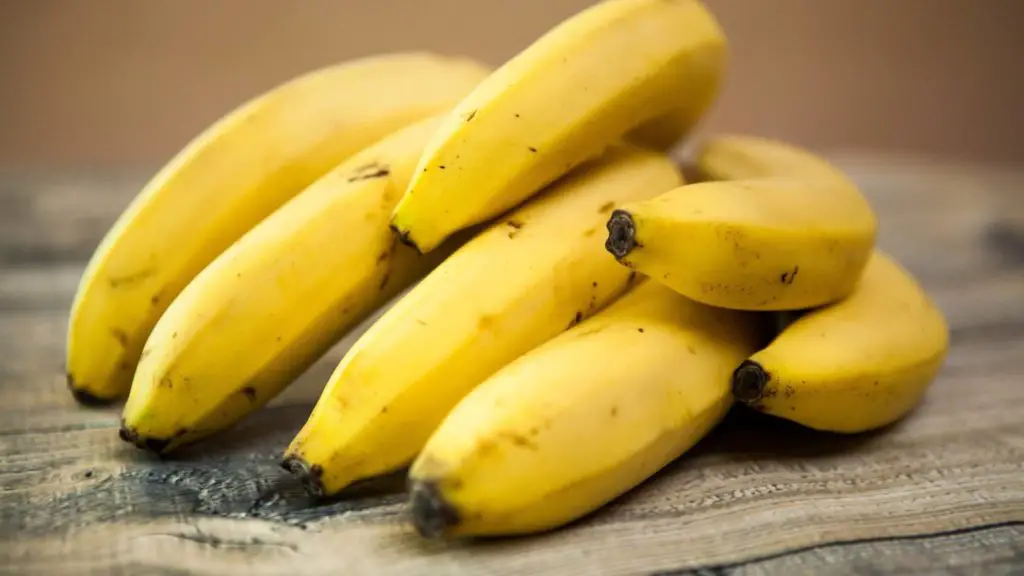
Let’s chat a bit about the bananas themselves.
Bananas are native to Asia but are now enjoyed globally as a tasty snack. They need warmer climates to grow and so can usually be found in tropical climates.
Distinctive for their bright yellow skin, bananas can actually be many different colors ranging from green to red.
Bananas contain many healthy properties, including fiber, potassium, vitamin B6, vitamin C, phytonutrients and antioxidants.
Technically, bananas are part of the berry family and grow on plants that can be up to 25 feet high. A bunch of bananas is called a hand while one single banana is called a finger. Between 10-20 banana fingers can be found on one hand!
With over 100 billion bananas eaten each year globally, they are recognized as being the fourth most popular agricultural product in the world.
Interesting facts about bananas
Did you know…
- Rubbing a piece of banana peel on your teeth every night will make them whiter.
- The inside of a piece of banana peel can be used to clean and polish leather shoes.
- A man in India once ate 81 bananas in 30 minutes.
- About 75% of the weight of a banana is water.
- About 50% of all people who are allergic to latex are also allergic to bananas.
Bananas truly are a strange and remarkable fruit!
Can guinea pigs eat bananas?
Yes! Guinea pigs can eat bananas. At least, in moderation. A small amount of banana can be fed to your guinea pig as a treat to keep them happy.
Because bananas are high in sugar, it is very important that bananas are kept as an infrequent treat for your guinea pig pet. Incorporating them too heavily into your guinea pig’s diet could lead to unwelcome side effects, as we’ll find out…
What is a good guinea pig diet?
It has been established by now that bananas are fine in small measure for your guinea pig. So, with that in mind, what else should they be eating to make up a healthy, balanced diet?
- It is important to remember that guinea pigs are herbivores, meaning their diet will be made up of plant-based foods.
- 80% of your guinea pig’s food should be made up of feeding hay or grass. This is vital to protect your guinea pig’s teeth and aid their digestive system.
- Fresh greens are an excellent source of vitamin C and guinea pigs should be fed about a teacup sized amount each day. Some great options include spinach, kale and romaine lettuce.
- Guinea pig nuggets – available from all good pet stores with quantity feeding instructions on the packet.
- 30-50mg of vitamin C. This is frequently found in the guinea pig nuggets but can also be sourced from certain fruits and vegetables.
- Assorted fruits and vegetables (bananas included) should make up approximately 10% of your guinea pig’s diet. Any unwanted or discarded food should be removed from your pet’s cage after one day.
- Clean, fresh water. This should be chlorine-free and refreshed in a new, clean container daily.
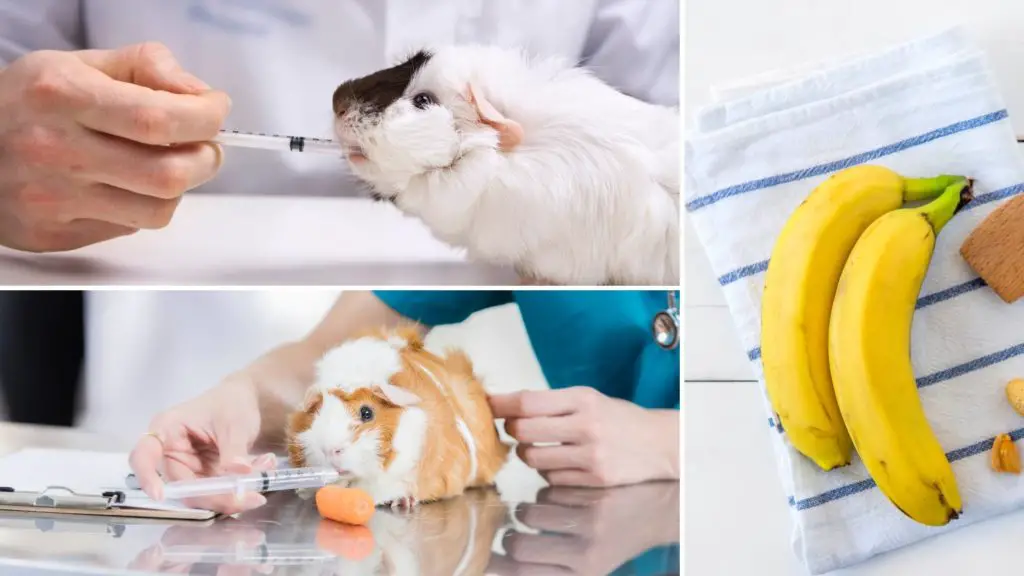
Fun facts about guinea pigs
Guinea pigs really are fascinating, clever animals with a whole range of character traits and lifestyle requirements. Here are some facts that you might not know about our banana-loving furry friends:
- Guinea pigs are not pigs! Instead, they are rodents.
- Guinea pigs don’t sweat.
- If you’re very patient and use food as a reward, guinea pigs can learn tricks. Here’s where that banana might come in handy…
- A male guinea pig is called a ‘boar’ and a female is called a ‘sow’. Baby guinea pigs are called ‘pups’.
- Guinea pigs’ teeth are constantly growing which is why you’ll always see them chewing to keep their teeth ground down.
- Guinea pigs have 4 toes on their front feet and 3 toes on their back feet.
- Rather than sleeping for long periods of time like we do, guinea pigs prefer to take lots of short naps.
- The oldest ever guinea pig lived to be 14 years and 10 months old.
- After just a few hours, newly born guinea pigs can run around. They’re even born with fur and teeth!
The verdict
After some debate, it is clear that yes, guinea pigs can eat bananas. While it is perfectly safe for your guinea pig to eat bananas, the tasty treat should be fed in moderation to avoid any unwanted side effects. There are plenty of other less sugary treats that can be substituted and incorporated into a varied, healthy guinea pig diet.
References:
- Love to Know, ‘Best Guinea Pig Breeds to Have as Pets’, https://small-pets.lovetoknow.com/rodents/guinea-pig-breeds, Accessed – 18 May 2021
- Dakota Hills Veterinary Clinic, ‘Common Illnesses in Guinea Pigs’, https://www.dakotahillsveterinary.com/black-hills-vet-common-illnesses-guinea-pigs, Accessed – 18 May 2021

